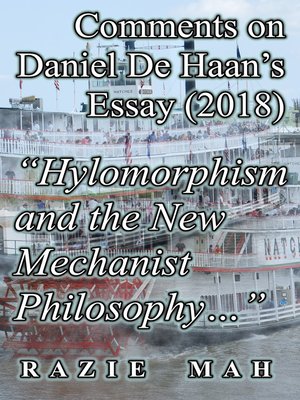Comments on Daniel De Haan's Essay (2018) "Hylomorphism and the New Mechanist Philosophy"
ebook ∣ Peirce's Secondness and Aristotle's Hylomorphism, #8 · Peirce's Secondness and Aristotle's Hylomorphism
By Razie Mah

Sign up to save your library
With an OverDrive account, you can save your favorite libraries for at-a-glance information about availability. Find out more about OverDrive accounts.
Find this title in Libby, the library reading app by OverDrive.



Search for a digital library with this title
Title found at these libraries:
| Library Name | Distance |
|---|---|
| Loading... |
Professor Daniel D. De Haan, at the University of Cambridge, contributes an essay to an edited volume, titled Neo-Aristotelian Perspectives on Contemporary Science. The collection is edited by William Simpson, Robert Koons and Nicholas Teh and published by Routledge in 2018.
The article is tidy. De Haan first discusses hylomorphism, then the new mechanist philosophy. He considers how they get along. He reflects on objections.
The developing mechanistic philosophy concerns biology, neuroscience and psychology. These sciences investigate things that are machine-like, because they have working components, and yet are single entities, with their own characteristic behaviors. The problem is that characteristic behaviors of the whole do not reduce to the component parts. A non-reductionist mechanistic philosophy is called for.
De Haan suggests that hylomorphism may help.
These comments propose that Aristotle's hylomorphism fits Peirce's category of secondness. Secondness consists of two contiguous real elements. Hylomorphism offers two: matter and form. So, what is the contiguity between them?
These comments also propose that mechanical philosophies may be diagrammed as two intercalated judgments, the Positivist's and the empirio-schematic. The positivist intellect relates the empirio-schematic judgment, as 'what ought to be', and phenomena, as 'what is'. The fly in this ointment is that phenomena are not all there is. There is also the thing itself, the noumenon. The noumenon cannot be objectified as its phenomena.
These proposals both disarticulate and rearticulate De Haan's suggestion and show how hylomorphism is surprisingly relevant the new mechanistic philosophy for biology, neuroscience and psychology.







